
Volume 1, Edition 2 | See Previous Editions
 Message from Jennifer LaPorta
Message from Jennifer LaPorta
FIU’s Chief Compliance and Privacy Officer
Our Compliance Team is pleased to be sharing with all of you, our second edition of Compliance Matters.
Can ethics be taught? Building an ethical workplace culture requires not only an emphasis on policy and training, but also on relationship-building and communicating core institutional values. Too often, what seems straightforward in a policy or regulation is far less so in our day-to-day work life – when applying those guideposts matters most. You may be facing a difficult choice because you are torn between competing goals or loyalties, your own interests seem to conflict with the interests of the University, or you fear retaliation or a negative impact in productivity or work relationships. These competing interests may lead you to feel that doing nothing is easier than making that tough decision. To empower ourselves to act with integrity and to make ethical choices, we must prepare. We must start to consider ethical decision making as a skill that each one of us has a responsibility to learn, practice and use to navigate difficult or unchartered territory. Ethics consists of knowing what we ought to do, and ethical knowledge can be taught.
In our second edition of Compliance Matters, we highlight the skill of ethical decision making and its foundational importance to our FIU culture. In our article on “Making Sense of Ethical Decision Making”, we explore the reasons why we all might hesitate to make a difficult decision and provide an ethical framework for doing so. Because we have distinct ethical obligations as Florida State Employees, we’ve included some Frequently Asked Questions regarding Florida’s Code of Ethics for Public Officers and Employees. You will also find in the Response-Ability Corner information on new policies, Export Controls, a highlight on FIU’s Gift Policy and other campus initiatives to help you respond to workplace issues. Finally, we encourage you to pay close attention to our Compliance Champion section, and to consider nominating an individual or department to be featured in future Compliance Matters editions.
This Newsletter serves as a communication tool and resource, supporting all of you in your daily efforts to build and maintain a culture of ethics and compliance. We encourage you to contact our team at compliance@fiu.edu with any questions, feedback, or ideas for future topics!
“Whoever is careless with the truth in small matters cannot be trusted with important matters.”
– Albert Einstein –
Making Sense of Ethical Decision-Making
Making ethical choices is often easier said than done. Maybe your coworker occasionally uses office resources and supplies to support a personal business, but you know your colleague struggles financially as a single parent and so you are hesitant to speak up. Or perhaps you are tempted to lie to your manager about completing a state required report to avoid admitting you missed a deadline. At its core, we have come to think of ethics as choosing between what is right or wrong, good or bad, acceptable or unacceptable behavior. But sometimes, the ethical choice may be deciding between two goods or between two “not greats” – the challenging ethical gray areas.
You may be facing a difficult choice because you are torn between competing goals or loyalties, your own interests seem to conflict with the interests of the University, or you fear retaliation or negatively affecting productivity or work relationships. These competing interests may lead you to feel that doing nothing is easier than making that tough decision. Too often, what seems straightforward in a policy or regulation is far less so in our real work life –when it matters most. To empower ourselves to act with integrity and to make ethical choices, we must prepare. We must start to consider ethical decision making as a skill that each one of us has the potential and responsibility to learn, practice and use to navigate difficult or unchartered ethical territory.
To arrive at ethical decisions in our day-to-day activities, as members of the University community, we first must commit to understanding the laws and regulations that impact our work, FIU policies and our overarching FIU mission and values. These guideposts are the starting point for ethical decision making in our workplace. We also must accept that “trusting our “gut” or our “feelings” is not always helpful and that the “path of least resistance” is not always the ethical one. Unexamined gut reactions can actually be dangerous – often our gut will tell us it is uncomfortable to do the right thing if it is hard or unpopular. Ethics is not blindly following culturally accepted norms or social practices. When we are thinking through a list of potential actions to take, we must consider options beyond what’s been done before. “We’ve always done it this way” is seldom the right answer to our ethical dilemmas.
We will all, at some point, encounter or witness ethical dilemmas in our workplace: inappropriate use of company resources for personal gain, discrimination and harassment, misuse of technology, dishonesty, or inappropriately accepting gifts. Even routine, seemingly insignificant day to day decisions have impact on culture. Laws, regulations, and policies are often geared towards preventing larger transgressions, however, unexamined day to day decision making that ignores ethical decision-making filters can nonetheless cause reputational harm and otherwise damage our institution.
When making the decision regarding what is ethically correct in a particular situation, you must think generally about the framework below, which includes gathering the relevant information, evaluating alternatives, testing your decision and then reflecting on the outcome:
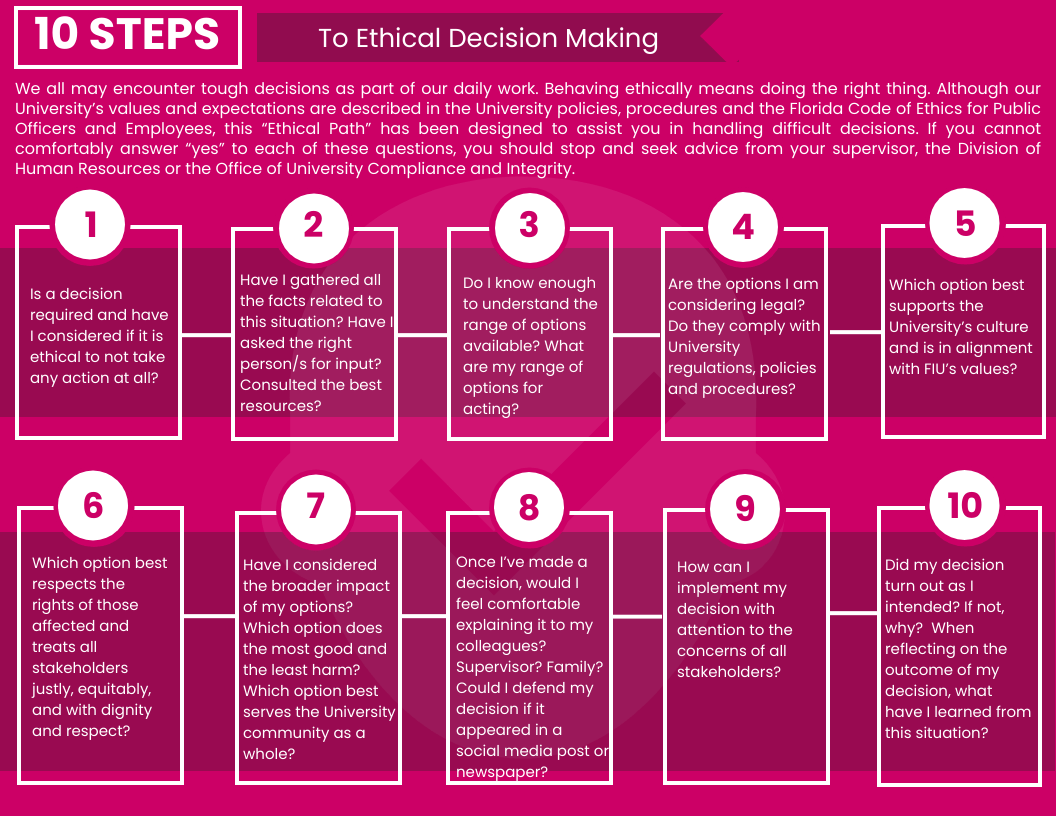
When making an ethical decision, you must weigh all of these considerations and how they may impact your course of action. The University will support you in doing the right thing and promoting a culture that encourages ethical conduct. If you believe something isn’t right, you also have a voice to speak up and share your concerns, knowing that we at FIU want to hear them. Don’t be afraid to create a dialogue with your colleagues, supervisor, Office of University Compliance, Human Resources, Office of General Counsel and others who may serve as a resource throughout our University Community to thoroughly talk through your options and concerns. While we urge you to choose courage over comfort, we recognize that in some situations that may include reporting anonymously using our Ethical Panther Hotline.
Finally, it’s important to acknowledge that when considering ethical dilemmas, you may not always make the right choice. Ethical dilemmas, by definition, often don’t involve simple, straightforward solutions. But remember, you are building a skill! As stewards of our University, we understand better than most the value of lifelong learning, personal progress, continuous process improvement and evolution. Honing the skill of Ethical Decision Making includes reflecting on your actions, correcting a decision that, in hindsight, was made in error and changing course back to the ethical path.
It is vital for all of us as one FIU to contribute to a strong organizational culture where misconduct and compliance failures are not tolerated, and ethical decision making is supported and celebrated. If we set this example, we will be modeling integrity and ethical conduct for our students – our future health care workers, lawyers, teachers, architects, engineers, politicians and business leaders!
As one of many resources, the Office of University Compliance & Integrity is here to assist you with ethical decision making. If you have any questions about the ethical decision-making process or wish to schedule a training for your Department, never hesitate to reach out to us.
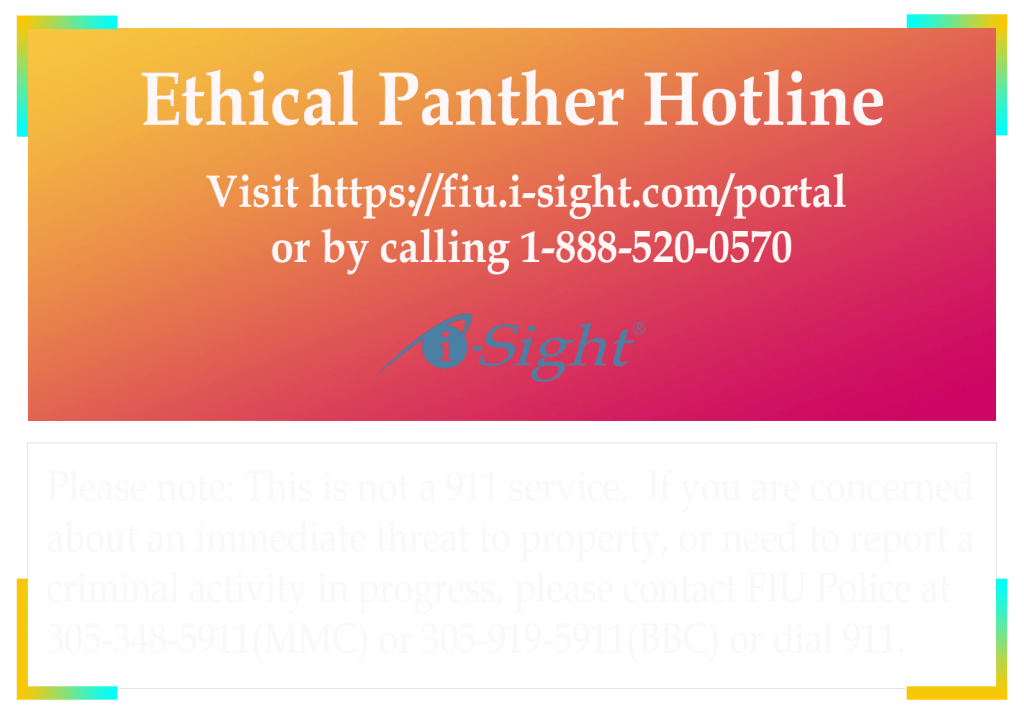
“State of Florida Code of Ethics for Public Officers and Employees” Frequently Asked Questions
Below we answer some Frequently Asked Questions regarding the ethical obligations of State of Florida employees. This information can also be found on our compliance website at compliance.fiu.edu.
1. What is the State of Florida Code of Ethics for Public Officers and Employees?
The State of Florida Code of Ethics for Public Officers and Employees contains standards of ethical conduct and disclosures applicable to public officers, employees, and others in State and local government. The code strives to ensure we, as public employees, conduct ourselves independently and impartially, not using our state employee positions for private gain.
2. Who at the University is subject to the State of Florida Code of Ethics for Public Officers and Employees?
All Florida International University employees are subject to the State of Florida Code of Ethics for Public Officers and Employees, Chapter 112 (Part III) of the Florida Statutes.
3. Where can I find the State of Florida Code of Ethics for Public Officers and Employees?
You can find and read the State of Florida Code of Ethics for Public Officers and Employees at the link here.
4. What are the main types of provisions of the State of Florida Code of Ethics for Public Officers and Employees?
The State of Florida Code of Ethics for Public Officers and Employees requirements generally consist of two types of provisions: 1) those prohibiting certain actions or conduct; and 2) those requiring that certain disclosures be made.
The actions that are prohibited center on:
- Acceptance and solicitation of gifts or benefits;
- Misuse of official position;
- Prohibited employment and business relationships; and
- Holding positions or entering into contracts that create or constitute a conflict between one’s personal interests and public duties.
Required disclosures include:
- Conflict of interest and outside activities;
- Full and public disclosures of financial interests by certain officials;
- Gift disclosures from government agencies and honorarium event related expenses, as required by the state requirements.
5. What are my obligations under the State of Florida Code of Ethics for Public Officers and Employees regarding accepting personal gifts?
University employees cannot solicit or accept personal gifts or benefits (loans, services, discounts) if:
1) the gift or benefit is based solely on the understanding that it will influence official action, or
2) the employee knows or has reason to know that it is being given to influence his or her official action.
Further, procurement employees and those designated by the University as a “reporting individual” cannot accept gifts greater than $100 or solicit any gifts for themselves or immediate family members from University vendors. The University maintains additional policies and procedures regarding gift acceptance that must be adhered to. For more information, please visit the Gift Policy in the University Policy Library.
6. What are my obligations under the State of Florida Code of Ethics for Public Officers and Employees regarding appropriately holding my official position as a public employee?
The State of Florida Code of Ethics for Public Officers and Employees also prohibits the attempt to use your official position or any property or resource, or the disclosure of sensitive or confidential information acquired as part of your official duties for personal gain or for the benefit of any other person or business entity.
7. Can I conduct business with the University in my private capacity?
Except for narrow exceptions, a University employee may not be employed or do business with any entity that does business with the University. Additionally, a University employee may not have or hold any employment or contractual relationship that would create a continuing or frequently recurring conflict between the employee’s private interests and the performance of his or her duties, or would impede the full and faithful discharge of the employee’s obligations to the University. These possible conflicts of interest relationships are addressed by the University through the required disclosure of outside activities. Please refer to the Conflict of Interest Policy and Ethics in Purchasing Policy in the University Policy Library.
8. Where do I complete my outside activity/conflict of interest disclosure?
Disclosures can be submitted in the PantherSoft system, whether there is an activity to report or not. You must learn more about your reporting responsibilities by attending a COI training on FIU Develop.
9. Are there penalties for violation of the State of Florida Code of Ethics for Public Officers and Employees?
Yes. Penalties for violation may include removal from employment, suspension, reprimand, demotion, reduction in salary level, and civil monetary penalties.
10. Who can I contact with any questions regarding my responsibilities under the State of Florida Code of Ethics for Public Officers and Employees?
You may contact the University Office of Compliance & Integrity at compliance@fiu.edu or the Office of the General Counsel at generalcounsel@fiu.edu.
Response-Ability Corner
This section provides you with up-to-date information regarding the policies, procedures, training and campus initiatives in place to support and resource your ability to respond to the workplace issues you may encounter. One of the important goals of the Office of University Compliance and Integrity is to bring awareness to the FIU community about existing, new and recently updated University-wide policies and procedures.
Please expand for new or updated policies since our last newsletter:
Professional Development
Want to earn some professional development credit? Learn even more about policies and compliance by visiting FIU Develop and searching for various compliance trainings that support your day-to-day work activities.

Export Controls Apply to YOU! – Resourcing your Response-Ability
Are you aware that Export Controls applies to all University faculty, staff, and students regardless of nationality or citizenship? Did you know that activities such as traveling internationally, shipping something internationally, performing research, attending an international conference, or providing distance education may all give rise to Export Control obligations? The University Compliance Office leads FIU’s Export Controls Compliance Program and has developed a wealth of easy to understand resources to provide you with the information you need to comply with Export Control Regulations across all academic, research, operational and business activities. Please take a moment to check out our new website https://exportcontrol.fiu.edu/ which describes, step by step, the measures our University Community must take to responsibly and ethically engage in international activities and collaborations.
International Shipping – Compliance Alert
Additionally, we know that many FIU faculty and staff are shipping items abroad to support members of the international FIU community. Current U.S. Government Export Control regulations require that certain international shipments be institutionally reviewed to determine federal export authorization (license) requirements. All international shipments now require an export control attestation by the shipper and/or review by the Office of Export Controls. Please visit the Export Controls Website for detailed instructions.
Policies and Procedures Library
Make sure to take a look at our revamped the Policies and Procedures Library, with a more easily accessible layout, and familiarize yourself with the University policies that apply to you! For guidance on developing a new policy or revising an existing policy, contact compliance@fiu.edu directly for further assistance.
Policy and Training Highlight: Gift Policy
FIU employees are subject to the Florida Code of Ethics for Public Officers and Employees which places restrictions on soliciting and accepting gifts and honoraria. It is important to keep in mind that as FIU employees, we must not:
- use our positions to obtain special benefits or privileges for ourselves or others and
- accept or request anything of value if might be perceived as influencing a work-related decision.
Examples of gifts may include but are not limited to food and beverages, lodging, admission fees, gift certificates, tickets to events, transportation, membership dues, and loans.
KEY INFORMATION TO REMEMBER IF ACCEPTING A PERSONAL GIFT FROM AN FIU VENDOR, POTENTIAL VENDOR, LOBBYIST, OR POLITICAL COMMITTEE:
Employees:
|
Reporting Individuals (A person who is required to file a state annual disclosure form with the Florida Commission on Ethics):
|
Procurement Employees (a person who decides or has influence in purchases or procurements of $10K or more in a fiscal year):
|
When making any decisions regarding gifts (including but not limited to honoraria, institutional gifts, fundraising, gifts from government agencies, lending institutions, etc.), please make sure to first refer to the Gift Policy and Procedure. Also, if there is any confusion in determining whether a gift is acceptable, employees should fill out and submit the “Gift Acceptance Questionnaire” found on the Office of University Compliance & Integrity’s website. As always, you can also contact compliance@fiu.edu with any additional questions.
Compliance Champion
When a call went out across the University early this year to recruit volunteers to support FIU’s COVID-19 vaccination site, a dedicated group of FIU employees selflessly answered that call without hesitation. For over six months, that same core group of FIU volunteers, joined by many others who gave what time they could, continued to spend long hours serving the greater good of the FIU community despite their full-time jobs and family responsibilities.
The COVID-19 pandemic wreaked havoc on the health care system, the global economy, and our daily lives. In early January, when FIU was chosen by Miami-Dade County through the Florida Department of Health to administer vaccines to the FIU community, organizers knew that gathering enough volunteers to facilitate getting “shots in arms” would be almost as crucial as the vaccine itself. FIU staff from across a diverse array of departments and units responded selflessly by offering their time, support, and dedication. Faculty, staff and students assisted with quickly checking people in for their appointments, answering their questions and concerns and scheduling second doses, while FIU volunteer nurses and doctors administered the vaccine.
Joann Cuesta-Gomez, Director of Employee and Labor Relations, herself a tireless volunteer, detailed the dedication of the FIU volunteer team. She described the long hours spent multitasking between the vaccine center and their already hectic jobs. Ms. Cuesta-Gomez explained the late afternoon hours volunteers spent tracking down additional employees interested in receiving the vaccine so that “not one dose would go to waste”.
We also spoke to Alexandra Mirabal, FIU’s Interim Controller, who became known for arriving early mornings with a Cuban Colada in hand to share with others. Her fellow volunteers described her as full of energy and ever ready to provide back-up and support where needed. Ms. Mirabal remembers “the first wave of the older generation first approved for the vaccine who demonstrated a sense of bravery and appreciation, many leaving their homes for the first time in months”. These early experiences inspired the volunteers and energized them with the knowledge that their hard work was making a difference.
Thanks to this early group of volunteers, FIU medical support staff, emergency management services, and the FIU Police Department, who collectively worked around the clock to organize, transport, and manage the vaccine center, FIU has, to date, administered over 16,700 doses of vaccine.
We remain grateful to the engaged, selfless, resilient volunteers – our Compliance Champions – who stepped up to the plate to support our community and bring great honor to all of us at FIU during these unprecedented times!
If you become aware of a person or department who has gone that extra mile to do the right thing for our FIU Community, let us know! We would like to reach out to let them know their efforts have been recognized and they may even be featured in a future edition of Compliance Matters!
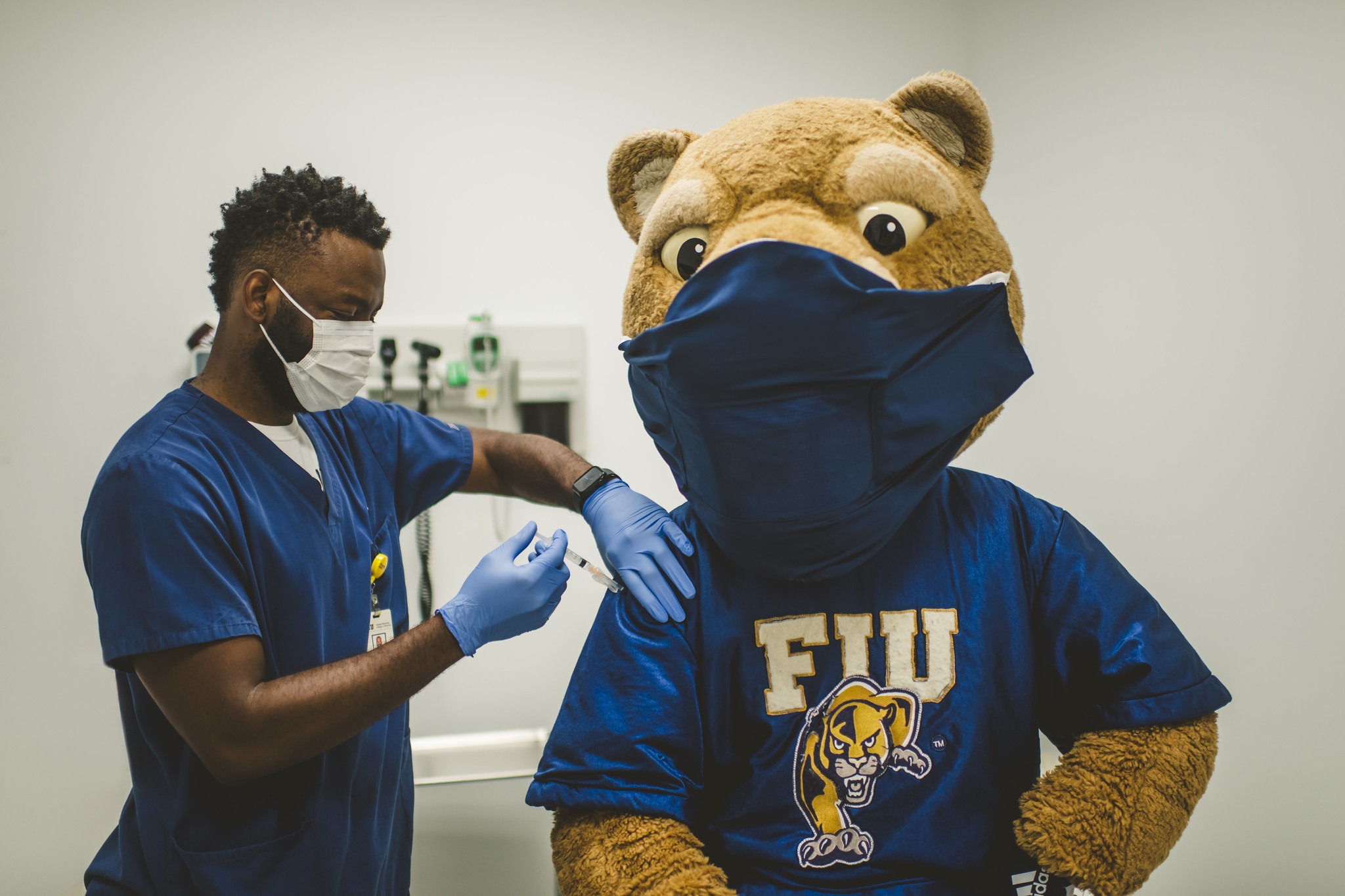
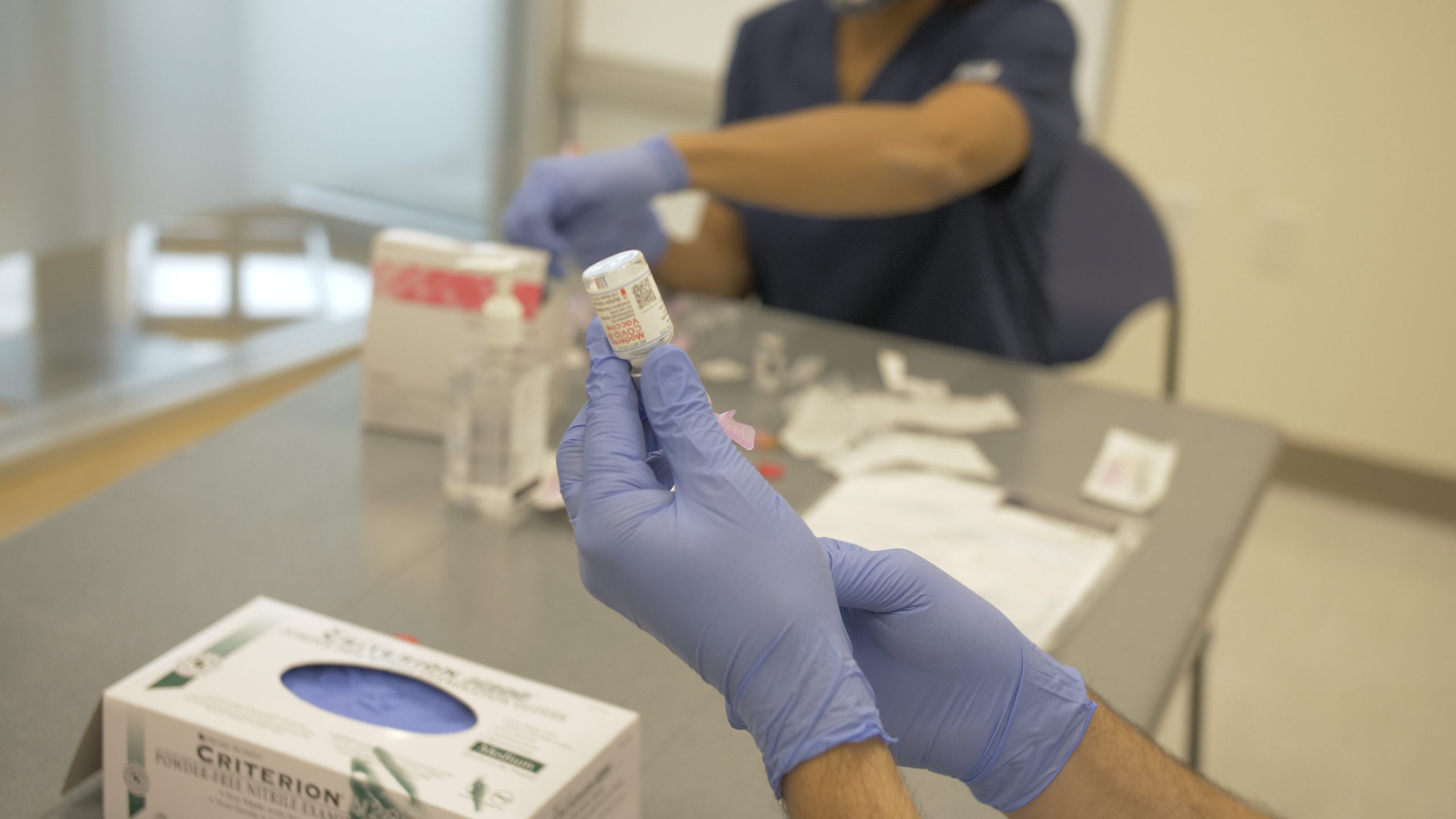
Meet our Team

Jennifer LaPorta
Chief Compliance & Privacy Officer

Luz Cabrera-Frias
Assistant Director Compliance

Dayanis Borges
Compliance Manager

Lilia Bourzac
Sr. Coordinator of Administrative Compliance

Steven Patterson
Director Compliance & Privacy Health Affairs
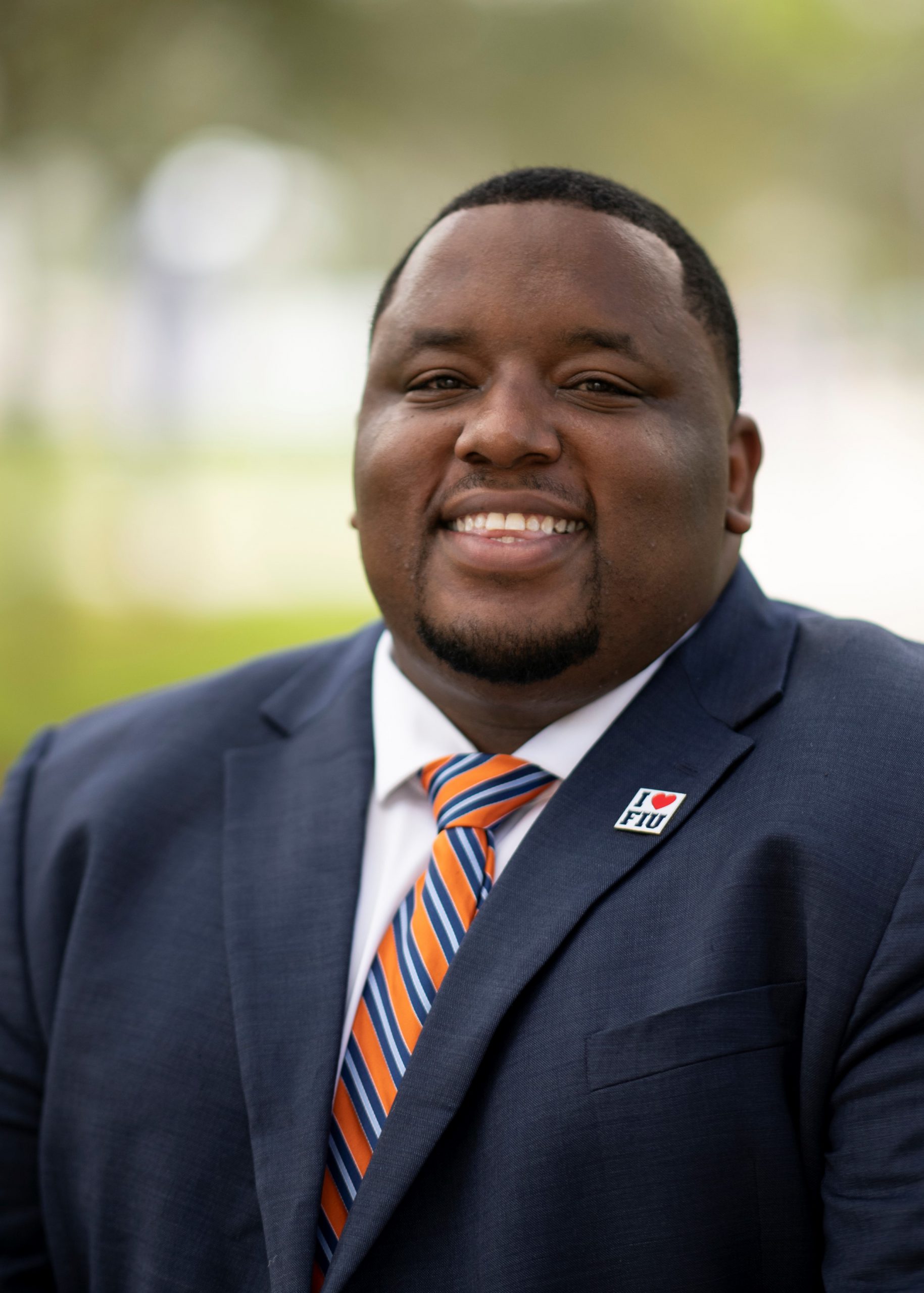
Kevin Kendrick
Assoc. Athletic Director Compliance

Octavia Gibbs
Sr. Director of Athletics Compliance - Financial Aid
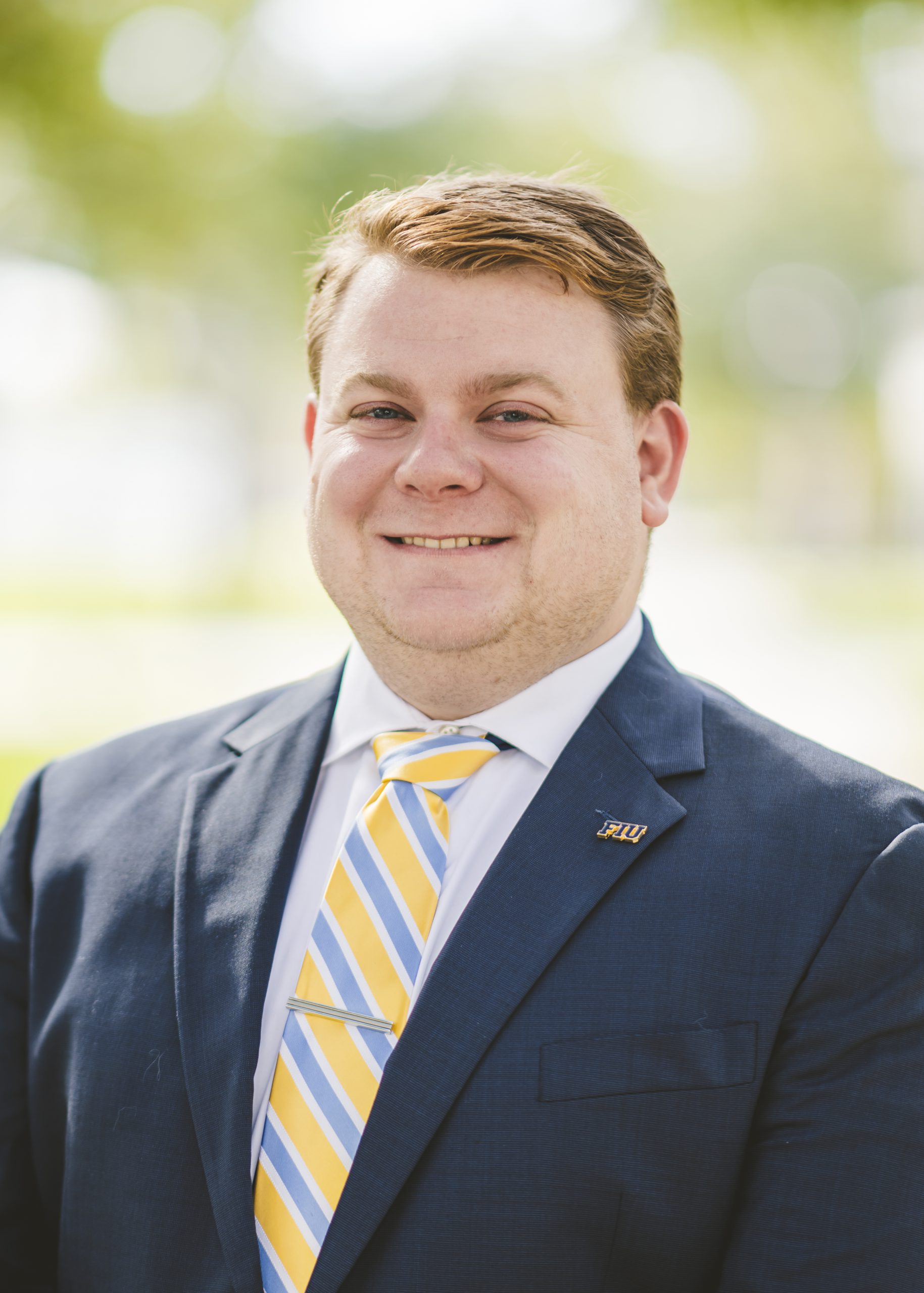
Jimmy Fleming
Director of Athletics Compliance - Eligibility
Our staff in the Office of University Compliance & Integrity is here to help you do the right thing! After all, compliance begins with each of us. Our goal is to promote a culture that encourages ethical conduct and a commitment to compliance with laws and FIU community standards.
Our office is responsible for the design, implementation and maintenance of the Compliance and Ethics Program at FIU. The Chief Compliance and Privacy Officer reports functionally to the Board of Trustees and administratively to the University President.
Please contact us if you have any questions or concerns that we can help you with. We’re really very nice!
Florida International University
Office of University Compliance & Integrity
11200 SW 8 ST, PC 429
Miami, FL 33199
305-348-2216 | compliance@fiu.edu | compliance.fiu.edu
